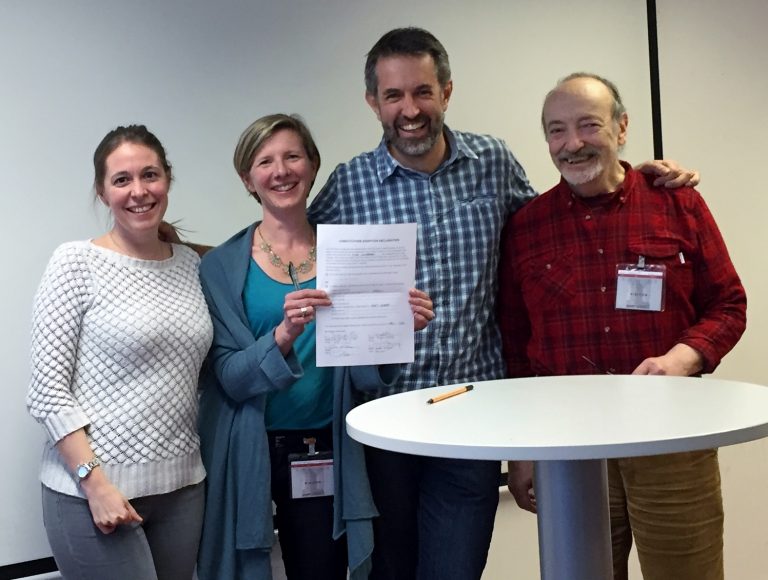Purposeful Patriotism
On a long drive last year, I found myself listening to a classical music radio station, and to one of the most inspiring pieces I can remember hearing.
The live recording, a concert by the Czech Philharmonic Orchestra, was made in Prague in 1939. Czechoslovakia had just been invaded by the Nazis. The Nazi flag had been hoisted at Prague Castle. Dissent was punishable by arrest and potentially death. Certainly, any nationalistic Czech displays were verboten. The national anthem had been replaced by the anthem of the Reich.
And here, on an evening in 1939, the people of Prague had gathered to hear Václav Talich conduct their own orchestra, playing their own music: Smetana’s My Country and Dvořák’s Slavonic Dances. The performance was a rousing one; but what made the hair stand up on the back of my neck was what followed. At the end, after a sustained standing ovation, the audience slowly, spontaneously began singing the Czech National Anthem. First just one or two voices, then several more, and eventually what must have been the entire concert hall, singing with all their might.
In doing so, they risked their own safety. But so strong was their commitment to their motherland that they were prepared to take the risk. Knowing that there were probably Nazi officials in the crowd, they nevertheless continued this spontaneous show of defiance and patriotism.
I wasn’t the only one to be moved. Countless listeners to the radio station called and texted to say how they had been moved to tears by this recording. Just typing this blog post brings back the strong emotion, which we felt so viscerally.
Patriotism. That’s not such a popular word these days. It’s particularly rare in corporate circles. But it got me thinking about purpose. I’ve worked with a number of companies in the process of redefining their purpose in the world. At worst, this is regarded as a necessary communications exercise; an opportunity to put something on a poster on the walls; a tick-box.
Many leaders have moved beyond this, though, and see the definition of purpose as an opportunity to create focus: an analytical exercise to better define “what’s in and what’s out” of the corporate mission. Google’s mission to “organise the world’s information” is a good example.
Rarer, though, is the sort of purpose that instills the level of patriotism displayed in that Prague concert hall in 1939. It’s not about the words. It’s about how that purpose lives in the hearts and minds of the people who work 40, 50 or 60 hours a week to bring that purpose to life.
In Built to Last, Jim Collins and Jerry Porras found, through rigorous research into companies’ share performance over time, that companies with a more compelling and shared sense purpose, vision and values were significantly more successful. I had the privilege of working in one of the companies in their study – Procter & Gamble. (Indeed, in my organisational development role there, helped to build alignment around a new purpose statement in the late 90s). P&G’s purpose is about producing “products & services of superior quality and value that improve the lives of the world’s consumers”. Last weekend, I met up with a P&G friend who has recently moved on, now to a pharmaceutical company. I noticed something interesting about how she described her new job. It gave her a chance to improve consumer’s lives, and therefore she was happy. The resonance between her own sense of purpose, and the company’s, was key for her.
Collins and Porris, writing in the Harvard Business Review in 1996, said: “Truly great companies understand the difference between what should never change and what should be open for change, between what is genuinely sacred and what is not.” Have a look at some of these examples, quoted by Collins and Porras:
Wal-Mart: To give ordinary folk the chance to buy the same things as rich people
Merck: To preserve and improve human life
McKinsey & Company: To help leading corporations and governments be more successful
Walt Disney: To make people happy
If you worked in those companies, would the purpose provide clarity and focus? Would it inspire you? Would it create genuine, spontaneous “patriotism” towards your employer – if, of course, you felt it was genuinely lived?
In Future Considerations, we redefined our vision, purpose and values three years back. Our purpose – “to enable the world’s leaders, institutions and systems to evolve, and to influence the great challenges of our time” – has proved very powerful in creating both focus and inspiration. It has helped us to be clear, not just on what sort of work we want to take on, but how we want to do it. At times it has galvanised the team and helped us to draw out that extra ounce of discretionary effort that’s sometimes needed. It resonates because we wrote it by asking ourselves what it was we truly cared about; our unique role in the world.
I realise that not all of our readers are corporate CEOs, able to define the purpose of a global organisation. But I would suggest that the definition of purpose is a powerful and important exercise – at whatever level you’re leading. I have worked with numerous teams where the creation of a team purpose was instrumental in ramping up the team’s effectiveness.
Ask yourself these questions:
:: as individuals, what are our personal reasons for being in the world? why do we care about these? (get to the core… listen intently to one another expressing these personal purposes, without judgment.)
:: as a team/business, what can we, together, uniquely do in the world?
:: if we didn’t exist, what would be lost?
:: what do we most deeply care about contributing?
I’d like to close this blog post with another story – also about patriotism. A long-term multinational client experienced a hostile takeover a few years back. I visited their head office and had lunch in the staff canteen while the acquisition negotiations were in full force. As a show of defiance, many staff were coming to work dressed in the company’s well-known brand colour. In knew, from my experience, the degree of commitment to the company, its vision, purpose, values and brands that everyday there people felt. Staff were symbolically prepared to take a stand for what they believed in.
As a leader, what level of patriotism do you believe you are unleashing among your people?
Mark is the Managing Director of Future Considerations. Click here to find out more about Mark and contact him for further information about his experience with the growth of the company.



